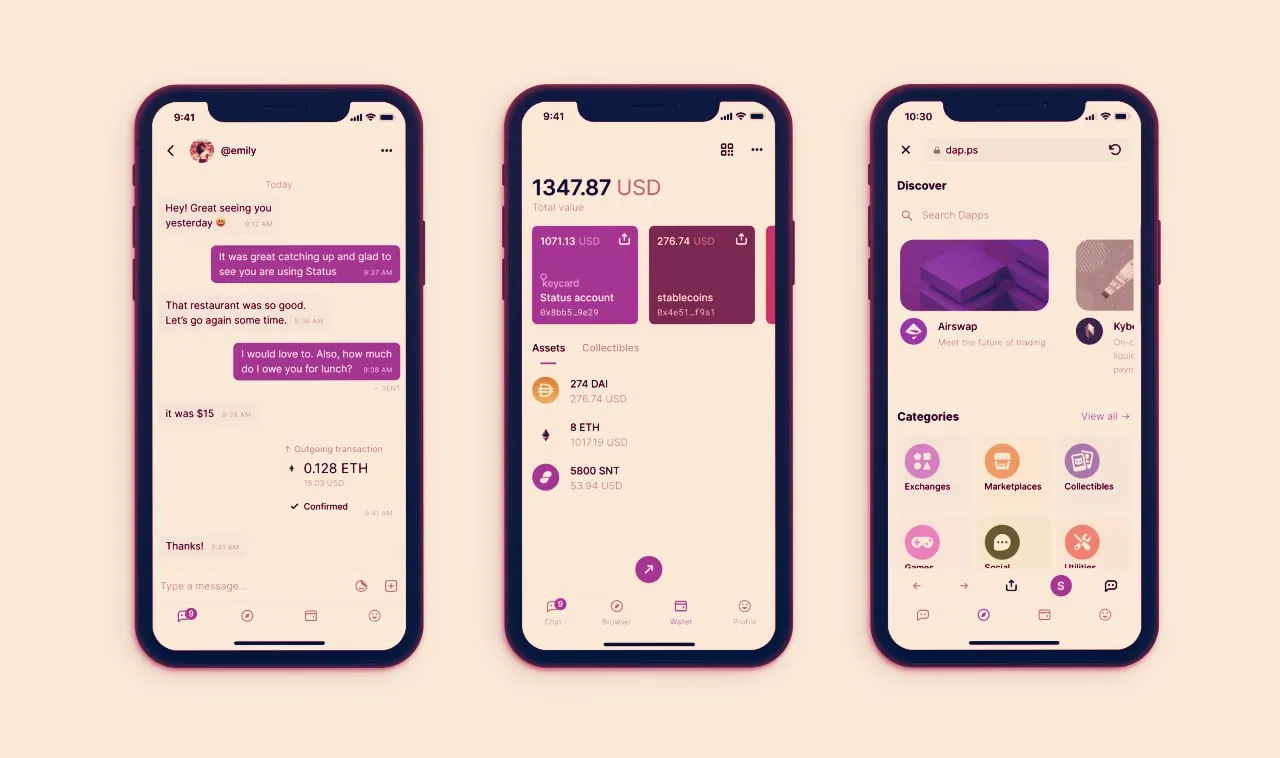In brief
- Status is an Android and iOS app that combines a peer-to-peer instant messenger with a crypto wallet and Web3 browser.
- It aims to provide a portal to the decentralized app (dapp) ecosystem.
- Status has recently updated its app to run on Waku, a fork of the Whisper protocol, making it less resource-intensive.
Data privacy is the issue of the moment; in a recent PwC survey, 85% of people polled around the world said they wished there were more companies they could trust with their data, and 85% wanted more control over their own data. The problem has been thrown into sharp relief by the coronavirus pandemic, with corporations and governments ramping up surveillance efforts in a bid to stop the spread of the virus.
For those who are keen to protect their privacy in the age of data harvesting, Web3 and decentralized apps (dapps) offer a possible solution—blockchain-powered applications that enable the user to control access to their personal data.
One project that’s aiming to provide a gateway to the dapp ecosystem is Status, a decentralized, privacy-first iOS and Android app that combines a peer-to-peer instant messaging platform with a crypto wallet and a Web3 browser that lets you access and run dapps.
“There's definitely a renewed interest in the concept of privacy and security,” Corey Petty, senior security engineer at Status, tells Decrypt. “What's changed is a larger awareness of selective disclosure—having the ability to choose where I'd like to release some of the requirements or restrictions that I have on my privacy and security.”
Getting started with Status
Because of its focus on privacy, setting up a Status account is a little more involved than your typical IM app. On launch, you’ll need to choose a three-word identity for yourself (“Thirsty Quirky Turkey” or similar). If you want a recognizable name, you’ll have to set up an ENS address, which means loading up your wallet (full disclosure: Status furnished Decrypt with a small amount of ETH and its own token, SNT, to test out the app’s features). Once you’ve set up your identity, you’re free to enter the app’s public chat channels or invite friends to DM.
Status’ secret sauce is its use of a peer-to-peer protocol, rather than a standard client-server model, which, together with end-to-end encryption, makes for greater privacy and censorship resistance, while allowing users to exert greater control over how their data is used.
Status v1.2 – Introducing Waku, a fork of the messaging protocol Whisper, designed for greater scalability. https://t.co/nVPa0GPucp
— Status (@ethstatus) April 7, 2020
Initially built on the Whisper protocol, Status’ 1.2 release introduces Waku, a fork of Whisper. “We’ve forked the original Whisper protocol to make it more scalable and amenable for resource-restricted devices,” Petty explains. That means Status can scale its user base without compromising on privacy and security: “People can use a private and secure messenger on their mobile phone without destroying their battery.”
Bringing dapps to your smartphone
Where Status differs from other IM apps is its inclusion of an ERC-20 wallet and dapps, accessed through an in-app browser. Using your wallet, you can send and receive ETH and other ERC-20 tokens within chat, or use them to power dapps running within the Status browser. Status’ own SNT token is used for in-app purchases like sticker packs, or to upvote and downvote dapps in the rankings (dapp developers can also bulk-purchase SNT to boost their apps up the rankings).
Simple. Global. Borderless
Easily send payments to friends, family, and peers all over the world with Status.#privacy #security #DeFi pic.twitter.com/Yp5AqrKMYq
— Status (@ethstatus) April 13, 2020
Dapps available through the Status browser include a mix of collectibles like Cryptokitties, and games, such as Etheremon and the Decentraland Marketplace. The big draw, though, is the platform’s selection of decentralized finance (DeFi) apps. “The majority of the audience who we're trying to reach with crypto-related stuff is DeFi people,” says Petty. “The people who are trying to interact with these things, but don't have a good interface on their phone.”
"The majority of the audience who we're trying to reach with crypto-related stuff is DeFi people."
“It should be very easy to get from one crypto to the next without relying on third parties,” Petty adds. “Using decentralized exchanges within the Status browser is a very easy way to go from one to the other, based on what you need, without having to go through any intermediary. So I can look at my wallet, I have ether in it. With a few clicks, I could be on a decentralized exchange and have whatever thing I need to interact with whatever dapp that I want.”
Privacy first?
There are one or two caveats to Status' privacy-first focus. As Decrypt recently reported, the Waku fork of Whisper cuts down on the amount of unnecessary information broadcast across the network, in order to make the app less resource-intensive—but that means that there's less junk data being bounced around the network to obfuscate users' identity. "It should be stressed that every message is still encrypted multiple times depending on its recipients, and a relaying node does not have personal information about the contents of the message," Petty told Decrypt in response. "The information a node can gather about its peers is still severely limited to network level metadata."
The other issue is that if users want to sign up for a recognizable identity, they need an ENS name. Unfortunately, as Decrypt reported, signing up for an ENS name can not only expose the user's identity even when a pseudonymous name is used; it's possible to track the flow of money between accounts, and even people's movements, using their activity on the blockchain.
The degree of exposure caused by one's activities on the blockchain is something the community needs to educate people about, says Petty. "This is a selective disclosure process; someone is choosing to attach something that's public and searchable to both their chat key and the wallet address that purchases that chat key." Status is working to make that link less obvious, but for the time being he adds, "In the process of registering that name, you are making that connection, and it should be understood that you're making that connection [...] We're actively looking for ways to make sure that the user is well informed during the process of the choices that they're making."
The future of Status
Status was created to deliver on the promise of Web3, Petty explains. “We wanted to build an application that provided a window to the Web3 vision, which was decentralized value transfer, decentralized messaging and decentralized storage, as promised by the Ethereum platform. Over the past few years, they've definitely delivered on the blockchain part, but there hasn't been a lot of resources on the initial implementation of decentralized messaging and storage.”
Now that they’ve laid the groundwork, Status plans to improve on the app’s UX, and incorporate unique features that are only possible using blockchain or crypto. “We've played around with a lot of ideas,” says Petty. “Like having chat rooms that are dedicated to a specific amount of proof, so you can't enter the chat room until you prove that you have some specific NFT, or number of tokens in your wallet.” Other possibilities include staking to make contact: “You can't contact this person unless you pay them, so people can monetize their influence. Even just seemingly subtle and simple things like replying to someone's message in a public chat with cryptocurrency itself as a tip, instead of an emoji.”
📣 We want your feedback! 🎛️
What features should we focus on next on our product roadmap for the mobile Status App? (psst, dark mode is coming soon)
Please give your ideas and thoughts here: https://t.co/sHTVlbBQNO pic.twitter.com/gBxRwMinUk
— Status (@ethstatus) April 14, 2020
The big question is, how does the app, and Web3 in general, scale to a wider audience? For the time being, the ecosystem is in its early stages. “I think everyone that's building on Web3 today is those early enthusiasts trying to get over that barrier and—to use a common phrase—flatten the curve,” says Petty.
“Maybe the user experience still has a large enough barrier that we haven't yet figured out,” he adds. “With the way things are going Web3 should be booming in terms of people jumping in because of their lack of happiness in traditional ecosystems. We'll keep trying to make it better; we'll keep trying to onramp more people. Now that we're ready to bring more people to the application, maybe we'll start seeing that over the next year.”





